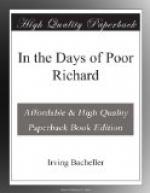“One remark of yours to Lord Howe impressed me. You said that Nature was our friend and ally. It put me in mind of the fog that helped us out of Brooklyn and of a little adventure of mine.”
Then he told the story of the spider’s web.
“I repeat that all Nature is with us,” said Franklin. “It was a sense of injustice in human nature that sent us across the great barrier of the sea into conditions where only the strong could survive. Here we have raised up a sturdy people with three thousand miles of water between them and tyranny. Armies can not cross it and succeed long in a hostile land. They are too far from home. The expense of transporting and maintaining them will bleed our enemies until they are spent. The British King is powerful, but now he has picked a quarrel with Almighty God, and it will go hard with him.”
CHAPTER XVII
WITH THE ARMY AND IN THE BUSH
In January, 1777, Colonel Irons writes to his father from Morristown, New Jersey, as follows:
“An army is a despotic machine. For that reason chiefly our men do not like military service. It is hard to induce them to enlist for long terms. They are released by expiration long before they have been trained and seasoned for good service. So Washington has found it difficult to fill his line with men of respectable fighting quality.
“Our great Commander lost his patience on the eve of our leaving New York. Our troops, posted at Kip’s Bay on the East River to defend the landing, fled in a panic without firing a gun at the approach of Howe’s army. I happened to be in a company of Light Horse with General Washington, who had gone up to survey the ground. Before his eyes two brigades of New England troops ran away, leaving us exposed to capture.
“The great Virginian was hot with indignation. He threw his hat to the ground and exclaimed:
“‘Are these the kind of men with whom I am to defend America?’
“Next day our troops behaved better and succeeded in repulsing the enemy. This put new spirit in them. Putnam got his forces out of New York and well up the shore of the North River. For weeks we lay behind our trenches on Harlem Heights, building up the fighting spirit of our men and training them for hard service. The stables, cabins and sheds of Harlem were full of our sick. Smallpox had got among them. Cold weather was coming on and few were clothed to stand it. The proclamation of Admiral Lord Howe and his brother, the General, offering pardon and protection to all who remained loyal to the crown, caused some to desert us, and many timid settlers in the outlying country, with women and children to care for, were on the fence ready to jump either way. Hundreds were driven by fear toward the British.




